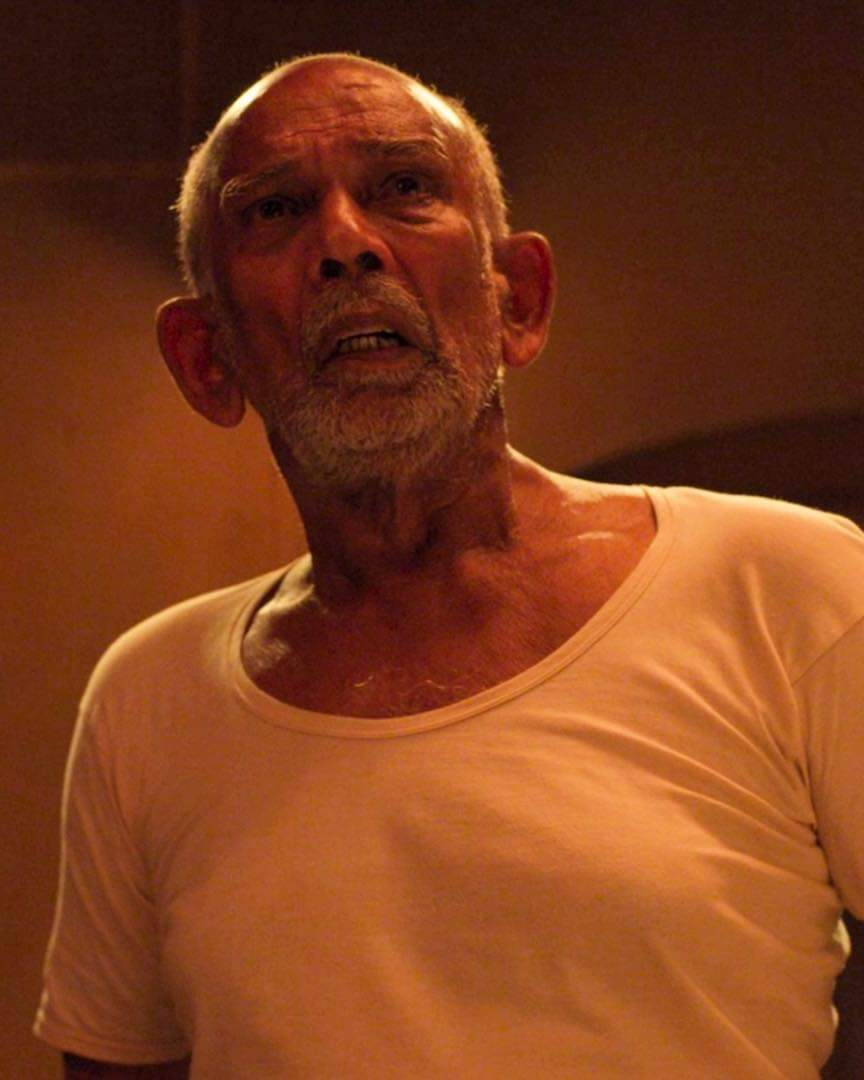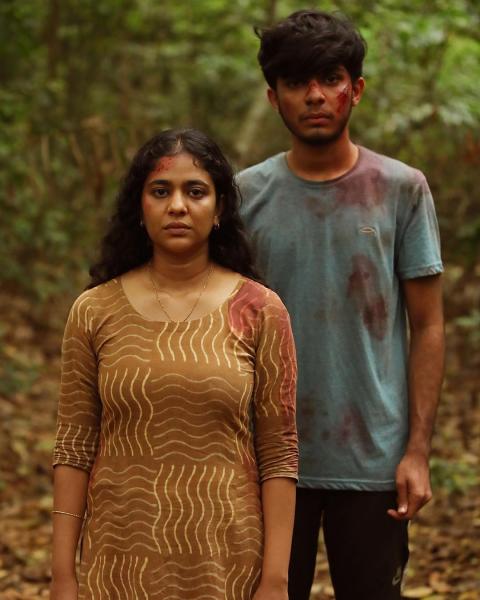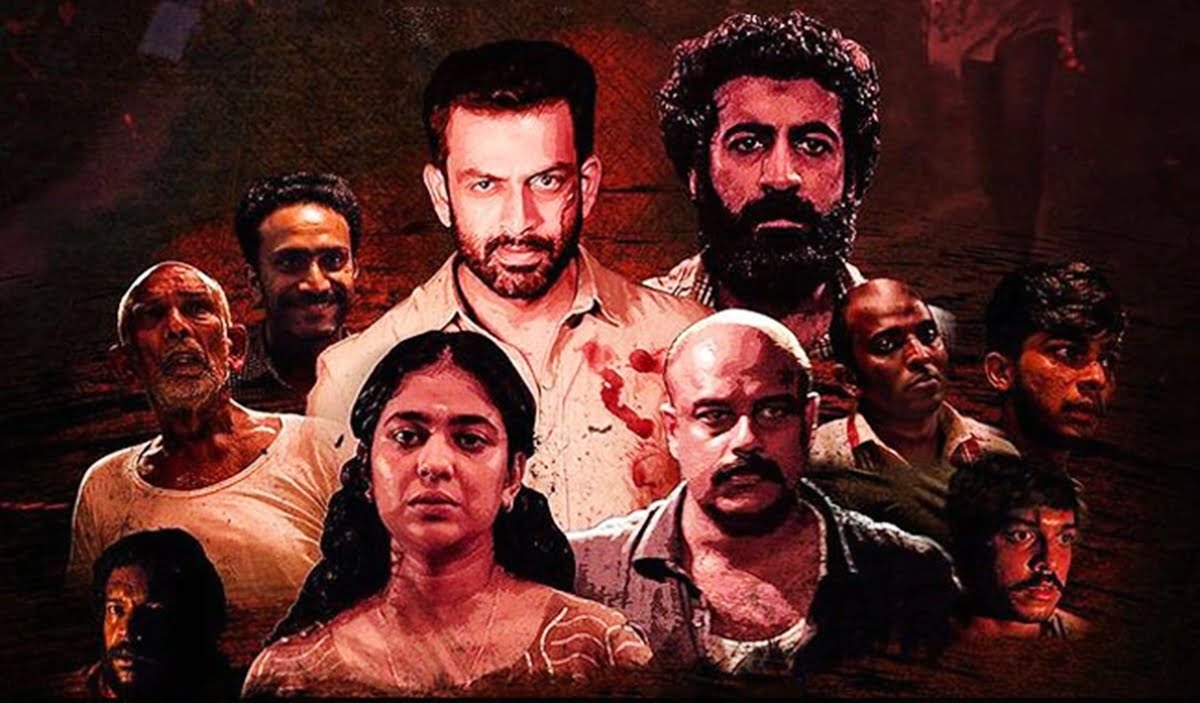Spoilers ahead
We witnessed open calls for Muslim genocide in the national capital while the Malayalam film industry is celebrating Kuruthi, a Prithviraj Sukumaran starrer directed by Manu Warrier and produced by Supriya Menon. Written by Anish Pallyal, the story is set in Eerattupetta.
Ibrahim (Ibru), played by Roshan Mathew, lost his wife and daughter in the landslide who is now left alone with his brother, Rasool and father Moosa. Suma, played by Srinda and her brother Preman, who also lost their spouses, are neighbors to Ibru. The story opens up when a policeman barges into Ibrahim’s house, unexpectedly one night, with Vishnu, who is accused of murdering a Muslim man. With a bunch of Muslims baying for the accused Hindu boy in revenge, Ibrahim is left responsible to protect the cop and the accused from them.
Kuruthi serves as an addition to the rightist binary propaganda: good Muslim VS bad Muslim trope, where both fight to rescue and redeem a ‘naïve’ Hindu boy, who killed a Muslim merchant for not closing his shop on their strike day. Apparently, in the film there is a ‘neutral’ Hindu police officer who gives insight to the ‘good’ Muslim character to protect the accused from the ‘bad’ Muslim extremists. If you think Kuruthi represents both Hindu and Muslim extremist sides overtly, virtuously intending to show how blind faith give birth to hate, can’t help saying that, you are too innocent here.
Also read: Film Review: Malik – A Political Drama Where The Poet’s Hero Clashes With The Director’s
Before pointing out how the characterisation of the extremist groups in this movie is biased, let me write it down. It is extremely horrific and menacing to see such explicit propaganda movies being justified by popular influential media. At the outset, the Muslim extremists are portrayed in Kuruthi as vehement hunters. With Navas’ character who almost looked like a zombie baying for blood, and the others quoting Quran and taking out weapons to kill whenever they get a chance, the movie pictures them as barbaric. Kuruthi miserably fails the Riz test within the first half hour. It is high time Malayalam filmmakers stop pretending to be woke by making films on Dalit and Muslims, by portraying them as terrorists and barbaric in the process.
With Navas’ character who almost looked like a zombie baying for blood, and the others quoting Quran and taking out weapons to kill whenever they get a chance, the movie pictures muslims as barbaric. Kuruthi miserably fails the Riz test within the first half hour.

But whenever the Hindu characters of Kuruthi delivers bigoted dialogues, of the two, the murderer is justified as a misled young lad. The repetitive emphasis on his young age and justification that his deed was done in a melee make him appear less dangerous (or done accidentally, driven by ‘justifiable’ circumstances). When Srinda’s character lists out all usual rightist arguments, asking out, “Wouldn’t they do the same if someone pollutes their mosque?” to forcibly justify the crime Vishnu did, there was not a counter argument to question it. If you did feel a pause there, which almost left you speechless, dare you not say that the crew were not intentionally doing this.
Again, when Vishnu’s character rants about not getting admitted into IIT because of caste reservations, Kuruthi which claims to show ‘both sides equally’ refused to bring even a counter dialogue there, but filled a logical pause. We only hear about what the Hindu boy did. But we are made to see, lengthy and detailed violence, to quote, ‘the graphic sadism’ that Muslim extremist groups do. While the two groups here bear equal wrongs, the film portrays the Hindu murderer as the one who is hunted, and the Muslim chasers as the savage hunters.
Also, the closure of Kuruthi brings two equally wronged characters, Rasool and Vishnu on the bridge: the scene brings more heed to Rasool’s character, which is portrayed bloodthirsty with the dagger rather than the other. Why are always Muslims shown as violent, if the other extremist people are equally bad too? Why did the narrative chose Muslim extremists to attack the police officer, but not like Hindu bigots trying to rescue him? Why is this the way movies always portray a certain section of people?

Coming to the cinematic aspects, the preachy dialogues and over-dramatic punch lines of Kuruthi were not any better. The filmmakers didn’t forget to include the essential sexist dialogues for the Muslim characters, to remind us the stereotype “that Islam always marginalise and oppress women” – the wise old Moosa played by Mamukoya says, “If you marry her, cooking for us (the other men in the family) is not her generosity but her duty”, Laiq, the young man, “asking what has a woman got to do where men are talking?”.
Coming to the cinematic aspects, the preachy dialogues and over-dramatic punch lines of Kuruthi were not any better. The filmmakers didn’t forget to include the essential sexist dialogues for the Muslim characters, to remind us the stereotype “that Islam always marginalise and oppress women”

Meanwhile Srinda’s character who is on the side of Hindutva extremists is portrayed as a strong woman of agency, who takes decisions on her own. The film promotes the character of Moosa as a “good and wise” character, who doesn’t question the other narrative, who doesn’t interrogate the fabricated history. A hidden propaganda which urges the minority communities to stay hushed and apolitical.
We watched Dalits fighting each other in Nayattu, now we have got Muslims fighting each other in Kuruthi. Now what’s next, Mollywood?
Featured image source: Instagram





Truly genuine observations……
Congrats….To Kaveri…..
Brilliant observation..the film has several cringe moments, and monsterises the muslim community